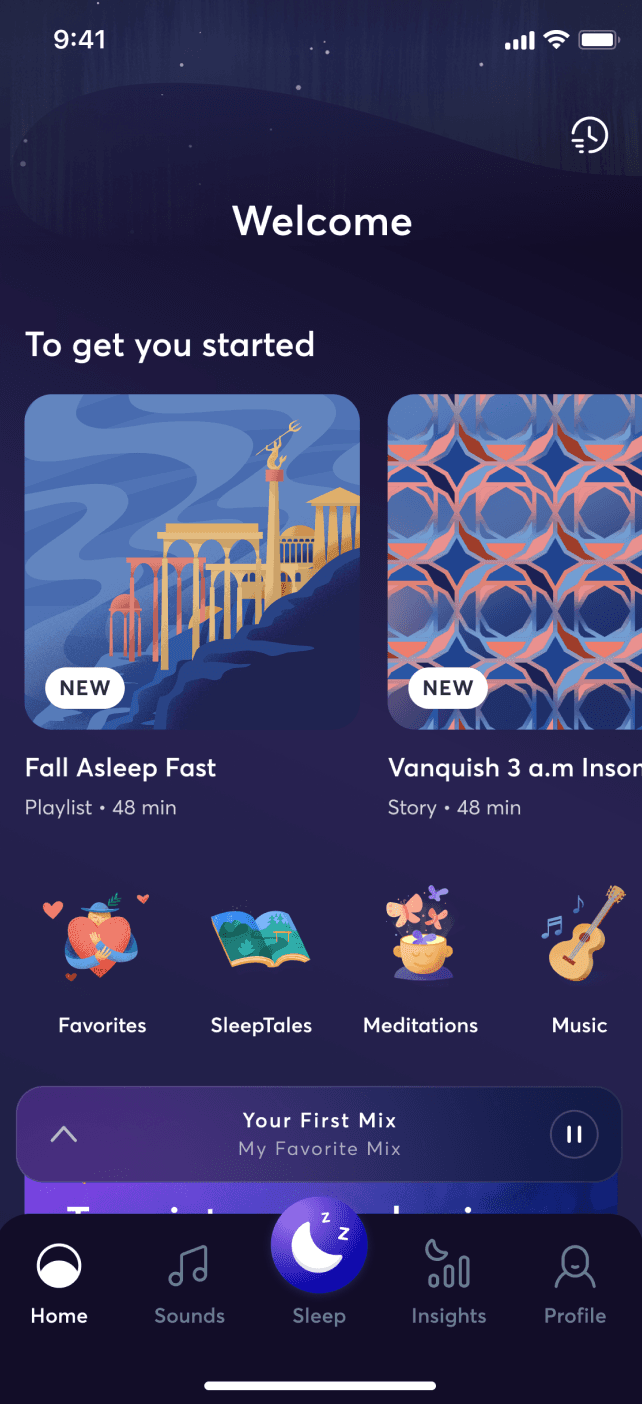
Bedtime Affirmations: The Power of Positive Thinking
It's no secret that positive affirmations work. By speaking positive statements about ourselves, we can program our minds for success and see massive changes across all areas of our lives.
But did you know that affirmations can be potent when spoken at bedtime? That's right - by taking a few minutes before we drift off to sleep to say positive affirmations, we can set the tone for our dreams and help manifest our desires overnight, boosting our self-esteem.
In this article, we'll explore how bedtime affirmations can work to improve our sleep, health, and overall wellbeing. We'll also provide examples of positive affirmations that you can use to get started.
What Are Bedtime Affirmations?
Bedtime affirmations are quotes, phrases, or mantras you say to yourself before bed. When you clear your mind with bedtime affirmations, you welcome relaxation because you focus on positive thinking. Pairing these affirmations with deep breathing will prepare your body for rest.
By speaking these affirmations out loud (or even just repeating them in our heads), we can subconsciously program our minds for success.
For example, let's say you're trying to manifest more money. You might use a positive statement: "I am worthy of abundance and prosperity." By saying this statement to yourself before you sleep, you're planting the seed in your mind that you are deserving of financial success.
As you repeat this affirmation night after night, your subconscious mind will begin to believe it too. This belief will manifest itself in your reality through improved circumstances and opportunities.
How Do Bedtime Affirmations Work?
Bedtime affirmations work by speaking directly to our subconscious minds. When we go to sleep, our conscious mind takes a break, and our subconscious mind takes over. This is why dreams can be so powerful - they're a way for our subconscious minds to process the events of the day and sort through our feelings.
Practicing affirmations is effective before sleep because they allow us to bypass the conscious mind and speak directly to the subconscious or unconscious mind. This is a highly effective way to communicate our desires to the universe, as our subconscious mind is incredibly powerful and influential.
Think of it this way - your conscious mind is like the captain of a ship, while your subconscious mind is like the crew. The captain can give orders and make decisions, but the crew carries out those orders.
In the same way, your conscious mind can set goals and intentions, but your subconscious mind will make those goals a reality in your own life.
The History and Psychology Behind Bedtime Affirmations
The history of bedtime affirmations dates back to the ancient yogic practice of Nidra, or sleep yoga. In this practice, yogis would repeat positive statements during sleep to program their minds for success.
The modern version of bedtime affirmations can be traced back to the New Thought movement of the 1800s. This spiritual movement was based on the belief that our thoughts and words have the power to create our reality.
Napoleon Hill and the power of affirmations
One of the most famous proponents of this belief was Napoleon Hill, who wrote the best-selling book Think and Grow Rich. In his book, Hill argued that wealthy people achieve success through positive thinking and positive affirmations about themselves.
"You are the master of your destiny. You can influence, direct and control your environment. You can make your life what you want it to be," Hill said in his book.
Since then, the practice of using affirmations has been adopted by self-help gurus, therapists, and life coaches all over the world.
The self-affirmation theory
In the 1980s, Claude Steele, a Stanford social psychologist, coined the term self-affirmation theory. Steele found that when we feel our sense of self is threatened, we will work to protect that sense of self. In other words, we become more resistant to change.
In one study, Steele and his team found that African American students who were asked to think about their race before taking a difficult test performed worse than those who didn't. The researchers concluded that the students' anxiety about confirming a negative stereotype (in this case, that African Americans are not as intelligent as other groups) was actually holding them back.
Positive affirmations help to protect us from these negative beliefs by affirming our core personal values. When we do this, we create a "buffer" against any outside threats. This buffer allows us to approach challenges with a sense of confidence and ease, rather than anxiety and stress.
Self-related processing
Self-related processing is the term used to describe our tendency to think about ourselves constantly. We do this to evaluate or judge some feature in relation to our perceptual image or mental concept of ourselves. For example, we're deciding whether or not to take a new job or move to a new city. In these cases, we constantly think about how the decision will affect us and our sense of self.
Researchers argue that self-related processing is an integral part of our decision-making process because it allows us to evaluate our options in relation to our values and beliefs. In order for affirmations to be effective, we need to think about them in relation to our own lives and experiences. This is why choosing positive affirmations that are personal and meaningful to you is important.


Bedtime and Positive Affirmations
One of the best times to practice affirmations is at night before bed. During bedtime, our minds are in a very receptive state - the theta state. This makes it the perfect time to practice positive affirmations to ourselves, as they will be more likely to 'stick' and take effect.
In this state, we are more open to suggestions, and our subconscious mind is more active. Therefore, we should also be careful about the affirmations we use at bedtime.
If we focus on negative things and worry about them before bed, our subconscious mind will become more active in trying to solve these problems. This can lead to insomnia and a less restful night's sleep, even developing harmful negative thought patterns.
By making positive changes at night, we can start our days off on the right foot - with a more positive outlook, a future orientation, and a greater sense of self-confidence.
Benefits of Bedtime Affirmations
There are many benefits to incorporating bedtime affirmations into your nightly routine. By speaking positive statements about ourselves before we sleep, we can:
- Release negative feelings
- During the day, we are bombarded with stressors and negative messages. This can make us feel overwhelmed, anxious, or down on ourselves. Bedtime affirmations can help to counterbalance our negative thinking by providing a regular dose of positivity. Focusing on the good in our lives before we sleep can release any negative emotions weighing us down.
- Set our intention for the future
- What we focus on expands. So, if we want to attract more positivity and success into our lives, we must set our intention for the future. During bedtime, we can use affirmations to visualize what we want to achieve and put our dreams into words. This helps to program our minds for success and gives us something to focus on when we wake up in the morning.
- Boost our self-confidence
- One of the main benefits of affirmations is that they can help to boost our self-confidence and help us overcome low self-esteem. When we repeat positive affirmations about ourselves, we start to believe them. This can profoundly affect our lives, as it allows us to approach challenges with a sense of ease and certainty.
- Improve our sleep
- When stressed, it can be challenging to fall asleep and stay asleep. We can encourage deep and restful sleep by using bedtime affirmations to relax our minds and body. This leaves us feeling well-rested and helps reduce stress levels and promote better mental health.
- Improve our physical health
- In addition to the mental benefits, there are also some physical benefits to using bedtime affirmations. When we focus on positive affirmations, we release feel-good chemicals like dopamine and serotonin in the brain. This can help to ease stress, improve our mood and promote deep relaxation.
- What's more, the physical act of speaking can also have a positive effect on our bodies. When we speak words of love and encouragement to ourselves, we activate the vagus nerve - which is responsible for reducing heart rate and blood pressure. This can help to lower our stress levels and improve our overall health.
- Self-confidence is also known to boost our immune system, so using bedtime affirmations can help to keep us feeling (and looking) our best.
Writing Effective Positive Affirmation Statements
Now that we know the benefits of using positive affirmations let's look at how to write them. When writing your affirmations, it's essential to keep a few things in mind: powerful words
Use affirmative language
Make sure that your affirmations are stated in the positive. For example, rather than saying "I will no longer be anxious," try "I am calm and at ease." This attracts positive energy, which is more likely to produce positive results.
Keep it short
You want your affirmations to be easy to remember, so make sure they are short and to the point.
Make it personal
Your affirmations should be specific to you and your goals. This will make them more powerful and effective.
Use the present tense
When you state your affirmations, use the present tense - as if they are already true. For example, "I am confident and successful" rather than "I will be confident and successful."
Believe it
For your affirmations to work, you need to believe them. So, make sure that the statements you choose resonate with you on a deep level.
How to Get Started with Bedtime Affirmations
Now that we know how to write effective affirmations, it's time to put them into practice. Here are a few tips to get you started:
Choose a quiet time
Bedtime is the perfect time to use affirmations, allowing you to focus on your goals without distractions.
Find a comfortable position
Sit in bed or lie down with your head resting on a pillow. You want to be comfortable to relax your mind and body.
Repeat your affirmations
Say your affirmations out loud, repeating them several times. You can also write them down or record them on your phone to play them back to yourself. You can also make them your positive daily affirmations, repeating them to yourself throughout the day.
Focus on your breath
As you repeat your affirmations, focus on your breath. This will help you to relax and let go of any stress or tension you may be holding onto. When you find yourself wandering into negative self-talk, gently bring your attention back to your breath and the present moment.


Release your doubts
It's normal to have doubts when you first start using affirmations. However, it's important to let go of these doubts and trust that the affirmations will work. Remember, you are worthy and deserving of your goals. Practicing self-affirmations is a powerful way to remind yourself of this truth.
Visualize your goals
As you say your affirmations, visualize yourself achieving your goals. This will help to increase their power and effectiveness.
Be patient
Change takes time, so don't expect to see results overnight. Be patient and consistent with your affirmations, and you will eventually see the desired results. You will see that self-affirmation alters your perception of yourself and your capabilities, which in turn will lead to changed behavior and improved results.
Types of Bedtime Affirmations
There are endless possibilities when it comes to choosing bedtime affirmations. Your affirmation will depend on your specific goals and needs and what resonates with you on a personal level.
Affirmations for Sleep
Bedtime affirmations are often about relaxation, sleep, and letting go of the day's worries. Here are a few examples to get you started:
I am now safe and sound in my bed, letting go of all the day's stress and tension.
I am deeply relaxed and drift easily off to sleep.
I am surrounded by love and light as I sleep.
Sweet dreams, I am looking forward to a restful night's sleep.
I wake up feeling refreshed and well-rested.
My mind and my body are ready to rest. I am in my sanctuary. Everything will be okay.
I will let every worry go. My eyes are tired, and my body and I deserve a good night of rest.
Stress and worries can't control me. I will let go and be at peace. I'm deserving of a good night of sleep.
I choose to have sleep, rest, peace, and relaxation over stress and worry.
My bedroom is my sleep sanctuary. As I lay here, I prepare myself for rest. My mind and body are open to rest. I let go of all stress and worry.
Nighttime Affirmations for Success
The affirmations you choose to practice at night can also impact you in the morning. Here are a few examples of success-oriented bedtime affirmations:
I am confident and ready to take on whatever comes my way.
I am successful in everything I do. I attract only good things into my life. I am grateful for my many blessings.
When I rest, my body can heal and rejuvenate itself. I wake up feeling refreshed, rested, and ready to tackle the day.
Sleep will help me achieve my goals. I am excited and eager to see what tomorrow brings.
I am a magnet for success. All of my dreams and goals are within my reach.
I let go of all negative thoughts and emotions before I sleep. I wake up feeling happy, healthy, and hopeful.
I will wake up refreshed and ready for the day.
I will take every opportunity head-on and be ready for the outcome it brings me.
I am great. I deserve rest to extend my greatness.
Bedtime Affirmations for Students
If you're a student, you may want to use affirmations to help you ace your exams or improve your grades. Here are a few examples to get you started:
I am confident and prepared for my exams. I trust in my abilities and know that I will do my best.
I am open to receiving all the information I need to do well on my exams. I relax and allow my mind to absorb all the information.
I am grateful for all the knowledge I have acquired. I know that it will serve me well in my exams.
I am ready to face any challenge that comes my way. I am strong and capable. I know that I can do anything I set my mind to.
I am a student of the world. I am constantly learning and expanding my horizons. I will do my best and be proud of my accomplishments.
I am grateful for my education. I know that it is preparing me for a bright future. I am excited to see what the future holds. I am confident in my abilities and know that I will succeed.
Bedtime Affirmations for Professionals
Professionals are often bombarded with negative thoughts and emotions. If you're looking for a way to reduce stress and anxiety, consider using bedtime affirmations. Here are a few examples to get you started:
Tonight, I will rest thinking I am thankful for my job and the opportunities it provides me.
I am confident in my abilities and know I do my best daily.
I am grateful for my successes and learn from my failures.
I am always moving forward and making progress in my career.
Rest and sleep are essential for me to perform at my best.
I am grateful for the chance to recharge my batteries.
There are enough hours in the day for me to accomplish everything I need to do.
Nighttime is a time for me to relax and rejuvenate.
Bedtime Affirmations for Parents
Parents often have a lot on their minds. If you're looking for a way to reduce stress and anxiety, consider the power of affirmations and use statements like:
Tonight, I am grateful for my children and the joy they bring to my life.
Sleep helps me be a better parent. I always wake up refreshed and ready to take on the day.
I am patient, kind, and loving with my children. I cherish every moment with them.
I am grateful for my parenting skills and the progress my children are making.
I rest tonight so that I can be fully present for my children tomorrow.
I am open to guidance and wisdom from my higher power. I trust that I am doing my best as a parent.
I am flexible and adaptable to my children's needs.
I am grateful for my parenting journey and the lessons I have learned.
Get Quality Sleep With Positive Affirmations and BetterSleep
The BetterSleep app focuses on providing quality rest for everyone. We help you overcome your sleep problems with a wide range of features to help you get a good night's sleep, including:
Visit the app today to learn what resources are available.






















